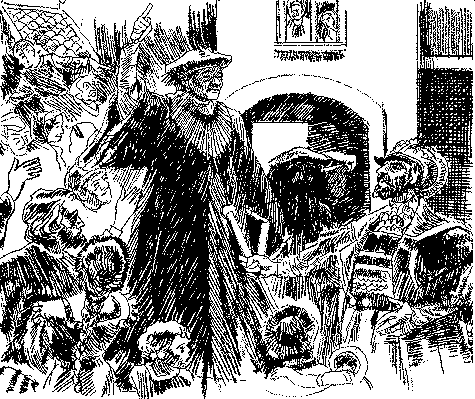|
The Gospel As the Power of God
Geoffrey J. Paxton*
 If asked whether or not they believe Paul's statement that the gospel is the power ot God (Rom. 1:16), evangelicals will unhesitatingly answer in the affirmative. In tact, they will often be indignant that they should even be asked such a question! But is the affirmation merely formal, or can we see the material evidence of it in our evangelical churches? Are our churches noted for solid, sound and sane expositions on the gospel? We believe that there is plenty of evidence to bring a verdict on the side of mere formal adherence! If asked whether or not they believe Paul's statement that the gospel is the power ot God (Rom. 1:16), evangelicals will unhesitatingly answer in the affirmative. In tact, they will often be indignant that they should even be asked such a question! But is the affirmation merely formal, or can we see the material evidence of it in our evangelical churches? Are our churches noted for solid, sound and sane expositions on the gospel? We believe that there is plenty of evidence to bring a verdict on the side of mere formal adherence!
Tragically, contemporary society is being starved for the exposition of the gospel. Notice, we did not say starved for sermons; we said starved for the exposition of the gospel. Peter Forsyth said, "It is not sermons we need, but a Gospel, which sermons are killing." —Peter Forsyth, The Church and the Sacraments, p.20.
The great majority of sermons heard today are characterized by the following:
1. "Thus saith the Lord" is replaced by "In my opinion," "The great majority of scholars concur," or some similar overthrow of the authoritative declaration of the prophet of God. The good news of God is replaced by the (more or less) good views of men. Perhaps the predominance of critical material over biblical studies and related subjects in our colleges and seminaries is the villain of the peace here. Ministers are being more educated but less trained for their God-given specific task of bringing, through the Scriptures, the mind of God to needy hearts and minds.
2. The solid and sane exposition of the gospel has been replaced by "devotional" or "inspirational" bursts. This type of preaching tends to be theatrical and pseudodramatic. The preacher is seen struggling to maintain the favorable impression of the congregation (viz., "He's a great speaker") rather than struggling under the burden of his life and death message.
A trait of such "emotional devotionals" is the centering upon uplifting personal experiences, not least those of the speaker. Schleiermacher's advice has been followed: ". . . preaching must always take the form of testimony . . . to one's own experience." —The Christian Faith, H. R. Mackintosh & J. S. Stewart (T. & T. Clark, 1928), p.69. Instead of the doing and dying of Jesus, the experiences of the speaker are central, making the mouths of the hearers water. The puny, sin-ridden and often vainglorious experiences of men have replaced the inexpressibly pure and glorious saving experiences of the Son of the most high God. What a thieving exchange! People may be impressed by the experiences of men, but only the experience of the Substitute will save them. Unlike Paul (2 Cor. 4:5), we preach ourselves, and not Jesus, as Lord.
 3. So much preaching is aimed at preserving the party line rather than breaking the bread of the gospel. This building of fences takes both a positive and a negative form. Positively, the enumeration of our distinctives takes place. The people are reminded of what it is that we believe, why it is that we are different from all others. Negatively, there is a sermonic blasting of the mines of others. The depth of our contribution is often measured by the intensity of our opposition. Remember, we are speaking of the preaching of evangelicals who say they really do believe the gospel to be the power of God! Where is the material evidence of this confession in all too many evangelical pulpits? 3. So much preaching is aimed at preserving the party line rather than breaking the bread of the gospel. This building of fences takes both a positive and a negative form. Positively, the enumeration of our distinctives takes place. The people are reminded of what it is that we believe, why it is that we are different from all others. Negatively, there is a sermonic blasting of the mines of others. The depth of our contribution is often measured by the intensity of our opposition. Remember, we are speaking of the preaching of evangelicals who say they really do believe the gospel to be the power of God! Where is the material evidence of this confession in all too many evangelical pulpits?
In mentioning the preservation of the party line, we are not suggesting for one moment that our people should not be kept in what we honestly believe to be the truth. However, this should be done in the context of the gospel and not as an isolated (and ideological) program. There is a vast difference between education in the truth of the gospel through painstaking exegesis and indoctrination and the preservation of in-group loyalty. The former will constantly bring our biases under divine scrutiny, whereas the latter will confirm the biases of our people. The former will be done in terms of the thorough investigation of the whole Bible, whereas the latter will be done with the aid of proof texts and cliches. The former will involve telling people hard sayings (not the same as harshness), while the latter will involve telling people what they want to hear.
 How often is a simplistic gospel taken to be the "simple gospel"! Some measure the worth of a sermon in terms of how little demand it makes on our brains. The rich gospel of the substitute Man is pruned and made to fit the hothouse atmosphere of the small rooms of our minds. How often is a simplistic gospel taken to be the "simple gospel"! Some measure the worth of a sermon in terms of how little demand it makes on our brains. The rich gospel of the substitute Man is pruned and made to fit the hothouse atmosphere of the small rooms of our minds.
4. How many of our evangelistic sermons and services are geared to the manipulation of the hearers! Though we say that we believe the gospel to be the power of God, we resort to other forces to wring a "decision" or some other response from those who have come to hear the Lord. This manipulation takes many forms. There is, for example, the use of an emotion-creating device. It may be the attempt to "create an atmosphere" — soft music, dimmed lights and a tear-jerking story. It may be a particularly "moving" song by a soloist. True, there is nothing wrong with the emotions, but it should be remembered that there is a wrong use of emotions. How amazing it is to see preachers who are quick to maintain the "free will" of man and to disparage Calvinistic emphases actually do all in their power to force people to make a decision and, at times, even to trick them into it!
The power of the gospel is denied and dishonored by such pulpiteering machinations. The manipulating power of men becomes the substitute.
Why is evangelical preaching in such a state? Doubtless, there are many answers (or, more correctly, many parts) to this question. Fundamentally, it is because we do not believe that the gospel is the power of God for salvation. Evangelical seminaries and colleges have substituted other things for the effective training of men and women in the gospel. We have become more academically respectable, but we are not good preachers of the gospel.1
The student minister is given a perspective in seminary which means that, when he comes out into the parish, he will do anything and everything except make the Scriptures his constant and diligent study. Notice, we said that he will do anything. He may distinguish himself around town in the local clubs. He may become a popular after-dinner speaker. He may take up additional university studies. He may do anything except become proficient in the Scriptures. Notice also that we said that he will do everything. Somehow his ministerial training has not taught him that, as a result of the gospel, God has distributed His gifts throughout the whole congregation. He will behave as though he is multi-gifted, even omni-gifted.
For these and many other reasons the minister will often use the labors of others (and at the last minute) to feed his flock. We can thank God for the labors of faithful servants. Who has not been greatly helped by such? The truth is, however, that God has never intended them to become a general substitute for lazy preachers. Secondhand food is better than no food at all, but healthy congregations grow on freshly-grown food. So will the preacher who tends the garden!
In the light of our very poor preaching, can we say that we still believe in the power of the gospel to convert the heart of the sinner? Do we really believe in the drawing power of the cross of Christ? Is the gospel our greatest confidence?
The Marks of Good Gospel Preaching
Let us conclude this article on "The Gospel As the Power of God" by looking at some of the marks of good gospel preaching:
1. Dr. Harold Lindsell of Christianity Today has recently written a book on The Battle for the Bible. This indeed is the central issue in evangelicalism today. We sincerely believe that the battle for the Bible is lost or won in the pulpit even more than in the scholar's study! Biblical preaching is preaching in which the authority of the Bible is seen and heard or is not seen and not heard. In the final analysis, the preacher does more to affirm or deny the final and full authority of the Bible than does the scholar. If we hop from one opinion to another rather than using a "Thus saith the Lord" in the sermon, people cannot but get the impression that the good views of men take precedence over the good news of God. There is a place for the considered opinion of scholars, but not a predominant place. Such opinions show people how knowledgeable we are, but will not save. The gospel alone saves.
It is not merely in saying "Thus saith the Lord" that the plenary authority of the Bible will be met. It will be present or absent more in how we use the Bible than in what we say about it. Frequently, one detects the idea that the authority of the Bible can be adequately honored by pious catch phrases instead of a painstaking care in the way we preach from it. Bad exegesis does more to damage the authority of the Bible than all the loud denials of "liberals." In the end we may discover that evangelical preaching has contributed more to the eclipse of the Bible than we would ever dare to imagine.
2. Biblical preaching is always preaching of the gospel. Listen to the salutary words of the respected Dr. H. Ridderbos in his great book on Paul's theology:
. . . Paul's preaching itself . . . is rightly and in the full sense kerygma of the Gospel, that is, announcement, proclamation of the coming of salvation. That Paul's epistles give what is no longer the first announcement of this Gospel, but rather the further exposition and application of it, does not detract from the fact that this Gospel is the sole and constant subject of his epistles also; and that therefore, if one has to characterize their general content not only as kerygma but also as doctrine and paraenesis, yet this doctrine has no other object and this admonition no other starting point and ground than the fulfilling and redeeming activity of God in the advent of Christ. —Paul: An Outline of His Theology, pp.47, 48.
(emphasis supplied)
Biblical preaching is always preaching of the gospel. Reflect upon this offensively simple statement, and you may begin to see into the heart of so much of the sickness of evangelical preaching today.
The gospel is the dictionary which gives all the words of evangelical preaching their specific and unique meaning. A gospel-less vocabulary is a meaningless vocabulary. The gospel defines faith, the gospel defines hope, and the gospel defines love. All evangelical sermons should be the "exposition and application" of the gospel.
 We dare not pass over this point without pressing it again. The gospel is the heart of biblical revelation. All comes into it, and all flows from it. Would we preach on a verse from the Old Testament? Then it must be an evangelical sermon. Would we preach on humility? Then it must be a sermon which receives its lifeblood from the gospel. Humility must be defined and applied from within the context of the gospel. Would we preach on election and neglect the gospel and election? Can we expound the second advent isolated from the context of the gospel? And what of the many exciting narratives in the Gospels (e.g., the feeding of the multitudes, Jesus' walking on the water, etc.)? Can we really preach upon such narratives without the gospel being their framework? Without such a framework, will we not end up with abstract notions of election, of humility, of power, of miracles, of need? We dare not pass over this point without pressing it again. The gospel is the heart of biblical revelation. All comes into it, and all flows from it. Would we preach on a verse from the Old Testament? Then it must be an evangelical sermon. Would we preach on humility? Then it must be a sermon which receives its lifeblood from the gospel. Humility must be defined and applied from within the context of the gospel. Would we preach on election and neglect the gospel and election? Can we expound the second advent isolated from the context of the gospel? And what of the many exciting narratives in the Gospels (e.g., the feeding of the multitudes, Jesus' walking on the water, etc.)? Can we really preach upon such narratives without the gospel being their framework? Without such a framework, will we not end up with abstract notions of election, of humility, of power, of miracles, of need?
Here lies the cause of much of the sterility of most evangelical sermons. The gospel is consigned to the role of a gate. Once we have entered in by it (some do not even consign it this role!), we may wander around homiletical fields at our leisure. So much of our preaching becomes governed by socio-cultural determinants or ideological forces. We have ceased to be evangelical preachers.
We have advocated the hermeneutical role of the gospel in other issues of Present Truth Magazine. Now we advocate the homiletical role of the gospel. The gospel is the homiletical determinant for evangelical preaching. All our sermons, in a rich and captivating manner, should know nothing save Jesus Christ and Him crucified and risen again. The Word of God should be made fully known (Col. 1:25).
We have dealt with the formal and material principles of the Reformation in the preceding two points. These are inseparably connected. However, the latter takes precedence over the former in that we come to the former via the latter. We come to believe in the plenary authority of the Bible via the gospel of the substitute Man, Jesus Christ. Encounter with Jesus Christ in the gospel is the door through which we enter into regard for the whole Word of God. Could it be that the crisis in regard to the formal principle is more determined by the often unrecognized crisis concerning the material principle than we have realized? Might not many folk find it less difficult to believe this or that section of the Bible if they could see it integrally related to the gospel of God's saving grace? Is not the gospel the power of God for salvation in this respect also? Think on these things!
 3. Biblical preaching is integrated preaching. Biblical preaching declares the whole counsel of God and not just this or that part of that counsel. Many congregations live spiritually from hand to mouth. The great majority of evangelical preachers feed their congregations on fragmented offerings. Often the determinant is what happens to take the preacher's fancy. Sometimes the daily newspaper plays the role of fons et origo for the preacher's thoughts for the day. 3. Biblical preaching is integrated preaching. Biblical preaching declares the whole counsel of God and not just this or that part of that counsel. Many congregations live spiritually from hand to mouth. The great majority of evangelical preachers feed their congregations on fragmented offerings. Often the determinant is what happens to take the preacher's fancy. Sometimes the daily newspaper plays the role of fons et origo for the preacher's thoughts for the day.
Ironically enough, most congregations are poor biblical theologians. Even after a lifetime of hearing sermons, they are bad biblical theologians! Speaking along these lines at a ministers' fraternal meeting, this writer was saddened when a middle-aged minister asked desperately, "Where do I begin?" This question came after twenty-five years of preaching!
The heart of the Bible is the gospel of the saving Person and work of Jesus Christ. This is the great integrative center of biblical theology. The picture is that of a great wheel with its mighty hub and the various doctrinal spokes radiating out from that hub. When the gospel is the integrative center, doctrinal preaching will become a delight and the people of God will be educated systematically in the great truths of the gospel.
This writer has been responsible for the training of young people from evangelical churches for the past seven years. On the whole, those students have been characterized by two things: (1) a self-confessed ignorance of the Bible and (2) an unshakeable dogmatism in what they believe!
Are evangelical churches educating or indoctrinating? Are we turning the people of God into intelligent spokesmen for the gospel or into parrots?
In summary: (1) biblical preaching is characterized by an authoritative "Thus saith the Lord," (2) it is always gospel preaching, and (3) it is preaching of the whole counsel of God — an authoritative, evangelical proclamation of the whole counsel of God! This is true biblical preaching. Let us be satisfied with nothing less.
*Geoffrey J. Paxton is an Anglican clergyman and well-known Australian educator and lecturer.
1 We do not intend to disparage true learning, only the confusion over what we should learn and in what perspective.
|
 If asked whether or not they believe Paul's statement that the gospel is the power ot God (Rom. 1:16), evangelicals will unhesitatingly answer in the affirmative. In tact, they will often be indignant that they should even be asked such a question! But is the affirmation merely formal, or can we see the material evidence of it in our evangelical churches? Are our churches noted for solid, sound and sane expositions on the gospel? We believe that there is plenty of evidence to bring a verdict on the side of mere formal adherence!
If asked whether or not they believe Paul's statement that the gospel is the power ot God (Rom. 1:16), evangelicals will unhesitatingly answer in the affirmative. In tact, they will often be indignant that they should even be asked such a question! But is the affirmation merely formal, or can we see the material evidence of it in our evangelical churches? Are our churches noted for solid, sound and sane expositions on the gospel? We believe that there is plenty of evidence to bring a verdict on the side of mere formal adherence! 3. So much preaching is aimed at preserving the party line rather than breaking the bread of the gospel. This building of fences takes both a positive and a negative form. Positively, the enumeration of our distinctives takes place. The people are reminded of what it is that we believe, why it is that we are different from all others. Negatively, there is a sermonic blasting of the mines of others. The depth of our contribution is often measured by the intensity of our opposition. Remember, we are speaking of the preaching of evangelicals who say they really do believe the gospel to be the power of God! Where is the material evidence of this confession in all too many evangelical pulpits?
3. So much preaching is aimed at preserving the party line rather than breaking the bread of the gospel. This building of fences takes both a positive and a negative form. Positively, the enumeration of our distinctives takes place. The people are reminded of what it is that we believe, why it is that we are different from all others. Negatively, there is a sermonic blasting of the mines of others. The depth of our contribution is often measured by the intensity of our opposition. Remember, we are speaking of the preaching of evangelicals who say they really do believe the gospel to be the power of God! Where is the material evidence of this confession in all too many evangelical pulpits? How often is a simplistic gospel taken to be the "simple gospel"! Some measure the worth of a sermon in terms of how little demand it makes on our brains. The rich gospel of the substitute Man is pruned and made to fit the hothouse atmosphere of the small rooms of our minds.
How often is a simplistic gospel taken to be the "simple gospel"! Some measure the worth of a sermon in terms of how little demand it makes on our brains. The rich gospel of the substitute Man is pruned and made to fit the hothouse atmosphere of the small rooms of our minds. We dare not pass over this point without pressing it again. The gospel is the heart of biblical revelation. All comes into it, and all flows from it. Would we preach on a verse from the Old Testament? Then it must be an evangelical sermon. Would we preach on humility? Then it must be a sermon which receives its lifeblood from the gospel. Humility must be defined and applied from within the context of the gospel. Would we preach on election and neglect the gospel and election? Can we expound the second advent isolated from the context of the gospel? And what of the many exciting narratives in the Gospels (e.g., the feeding of the multitudes, Jesus' walking on the water, etc.)? Can we really preach upon such narratives without the gospel being their framework? Without such a framework, will we not end up with abstract notions of election, of humility, of power, of miracles, of need?
We dare not pass over this point without pressing it again. The gospel is the heart of biblical revelation. All comes into it, and all flows from it. Would we preach on a verse from the Old Testament? Then it must be an evangelical sermon. Would we preach on humility? Then it must be a sermon which receives its lifeblood from the gospel. Humility must be defined and applied from within the context of the gospel. Would we preach on election and neglect the gospel and election? Can we expound the second advent isolated from the context of the gospel? And what of the many exciting narratives in the Gospels (e.g., the feeding of the multitudes, Jesus' walking on the water, etc.)? Can we really preach upon such narratives without the gospel being their framework? Without such a framework, will we not end up with abstract notions of election, of humility, of power, of miracles, of need? 3. Biblical preaching is integrated preaching. Biblical preaching declares the whole counsel of God and not just this or that part of that counsel. Many congregations live spiritually from hand to mouth. The great majority of evangelical preachers feed their congregations on fragmented offerings. Often the determinant is what happens to take the preacher's fancy. Sometimes the daily newspaper plays the role of fons et origo for the preacher's thoughts for the day.
3. Biblical preaching is integrated preaching. Biblical preaching declares the whole counsel of God and not just this or that part of that counsel. Many congregations live spiritually from hand to mouth. The great majority of evangelical preachers feed their congregations on fragmented offerings. Often the determinant is what happens to take the preacher's fancy. Sometimes the daily newspaper plays the role of fons et origo for the preacher's thoughts for the day.